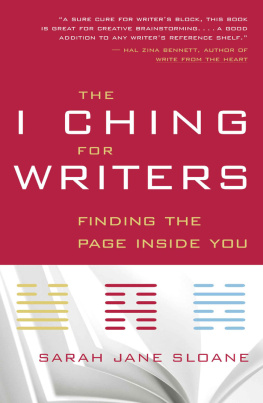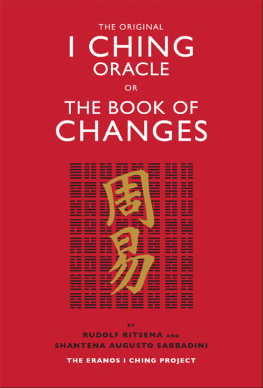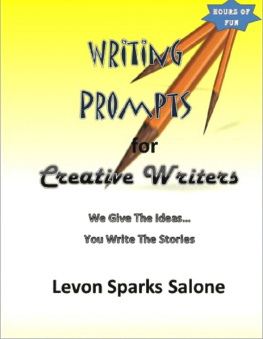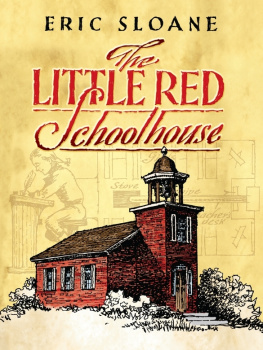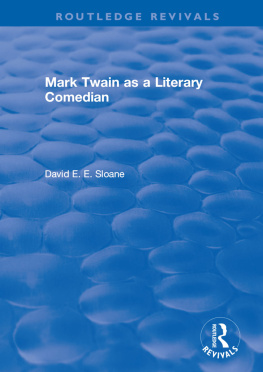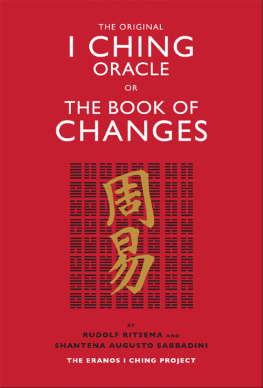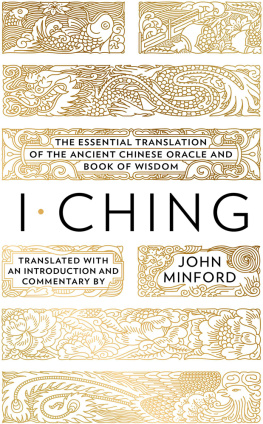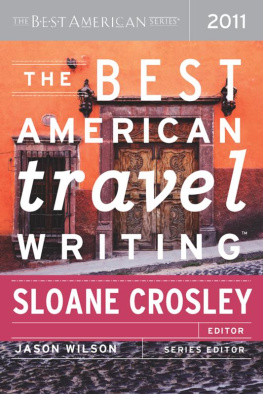Praise for The I Ching for Writers
At last, an indispensable writing book that persuades us to gamble Eastern style, with an honorable sensibility. The stakes are high, for if we cast our lot with Sarah Jane Sloane and her I Ching for Writers, were making a serious investment in our writerly selves. Sloanes path to the numinous requires three ordinary pennies, paper, pencil, and a reliance on things both mystical and practical, offered by a wise and courteous croupier whos on our side, gently coaxing us to take chances, to keep playing.
Leslee Becker, author of The Sincere Caf and professor of English at Colorado State University
As a seeker whos consulted the I Chings wisdom for many years, Im thrilled to discover a new book of interpretations as seen through the prism of writing. Just the names of the hexagrams themselves promised an oracle that would speak directly to what matters most to me my writing. I could hardly wait to throw my first hexagram. If youre a seeker like I am, or simply curious, I encourage you to let this wonderful oracle reveal its magic to you. Thanks, Sarah Jane Sloane, for creating this relevant, new translation of an ancient wisdom.
Judy Reeves, author of A Writers Book of Days
Sarah Sloanes The I Ching for Writers is a rare find: a writing guide that is itself delightful to read. Dr. Sloane provides wise counsel here. Her advisories offer astute assessments of the writing process (and of life in general); her exercises are unique and inventive but grounded in the practices of a skilled writing teacher. This book is rich and engaging. I look forward to using it with my students in my courses on creative nonfiction!
Cynthia Cox, director of writing programs and associate professor of English at Belmont University
A sure cure for writers block, this book is great for creative brainstorming and keeping works in progress progressing. A good addition to any writers reference shelf.
Hal Zina Bennett, author of Write from the Heart and Writing Spiritual Books
Those who struggle with writing and they are legion know in their bones what it feels like to be wordless and silent. Into this uneasy space steps Sarah Jane Sloane, with a dazzling display of imaginative advice for writers in The I Ching for Writers: Finding the Page Inside You. Take this journey with Sloane as she works through what the I Chings sixty-four hexagrams can tell you about your writing self; then see how your imagination takes up the writerly challenges offered here. Most of all, do as Sloane instructs: Find the connections, listen with the inner ear to the secrets of the heart. You may well be surprised, and greatly heartened, by what you hear.
Andrea A. Lunsford, professor of English and feminist studies, Stanford University
THE I CHING
FOR WRITERS
THE I CHING
FOR WRITERS
FINDING THE
PAGE INSIDE YOU
SARAH JANE SLOANE
N EW W ORLD L IBRARY
N OVATO , C ALIFORNIA

Copyright 2005 by Sarah Jane Sloane
All rights reserved. This book may not be reproduced in whole or in part, stored in a retrieval system, or transmitted in any form or by any means electronic, mechanical, or other without written permission from the publisher, except by a reviewer, who may quote brief passages in a review.
Cover design by Mary Ann Casler
Interior design by Tona Pearce Myers
Library of Congress Cataloging-in-Publication Data
Sloane, Sarah.
The I Ching for writers : finding the page inside you / Sarah Jane Sloane.
p. cm.
Includes bibliographical references and index.
ISBN 1-57731-496-4 (pbk. : alk. paper)
1. Written communication. 2. Yi jing. I. Title.
P211.S62 2005
808.0201dc22
2004023296
First printing, March 2005
ISBN 1-57731-496-4


Distributed to the trade by Publishers Group West
10 9 8 7 6 5 4 3 2 1
FOR JUDY
Staunchest Ally
Closest Companion
Dearest Friend
CONTENTS
The people who help me most with my writing are those whose conversation and character give shape and meaning to my life.
I am particularly grateful to my mother, father, and brother for their support and love.
Rare teachers, people who genuinely nurture their students, for me include Andrea Lunsford, Beverly Moss, Cynthia Cox, Rich Enos, Anne Herrington, Marcia Curtis, Sara Stelzner, and Charlie Moran. More recently, Donna LeCourt, Lisa Langstraat, Mike Palmquist, Kate Kiefer, Sue Doe, and Liz Jackson have shown me what a dedicated and collaborative faculty can do.
Buddhist practitioners, members of the Gurdjieff community, longtime throwers of the I Ching, alternative health practitioners, or seekers in general who have helped me include Susan Aposhyan, Patrick Brennan, Susan Brown Carlton, Matt Cary, Monica Kaup Cary, Tammas Kelly, Brody LaRock, Carroll Smith, and Stuart Smithers.
I thank my agent, Sheree Bykofsky, and my editor at New World Library, Jason Gardner. Thanks to Carol Venolia for her gentle copyediting. And many thanks to Craig Hollow for our conversations and the photographs.
Finally, writer Judy Doenges best friend, inimitable ally, and fierce protector has helped me steadily in every way for the last twenty years. To her I dedicate this book.
When you are up against the wall and cant think of a thing to write, frustration sets in. I tell my students its like being in a vehicle with no gas, no tires, no map, and no road ahead. You cant get traction no matter how hard you try. And after a long day or night of trying to write, other responsibilities intervene: a meal must be cooked, the pets fed, your children put to bed, the newspaper skimmed, your partners day heard, and still you have written nothing. At night you do anything you can to avoid the blank page, including watching TV or going to the movies. Theres nothing inherently wrong with these activities, but they distract you from the hard work of putting words on a page, one after another, day after day. They keep you from discovering what it is you want to write and from faithfully writing it down. At times like this, sometimes a suggestion from outside your own mind can prime the pump. I offer this adaptation of the I Ching to feed your imagination and get you writing for real.
Feeding your imagination is one of the most important activities of a writer, as the poet Madeleine DeFrees once told me. The imagination is something like a Southern conjure-woman or sorceress, who hides and spins spells deep into the night. Your feelings of intuition are simply her breath on the back of your neck. To keep the conjure-woman happy, you have to feed her with stories and music and just being wild.

